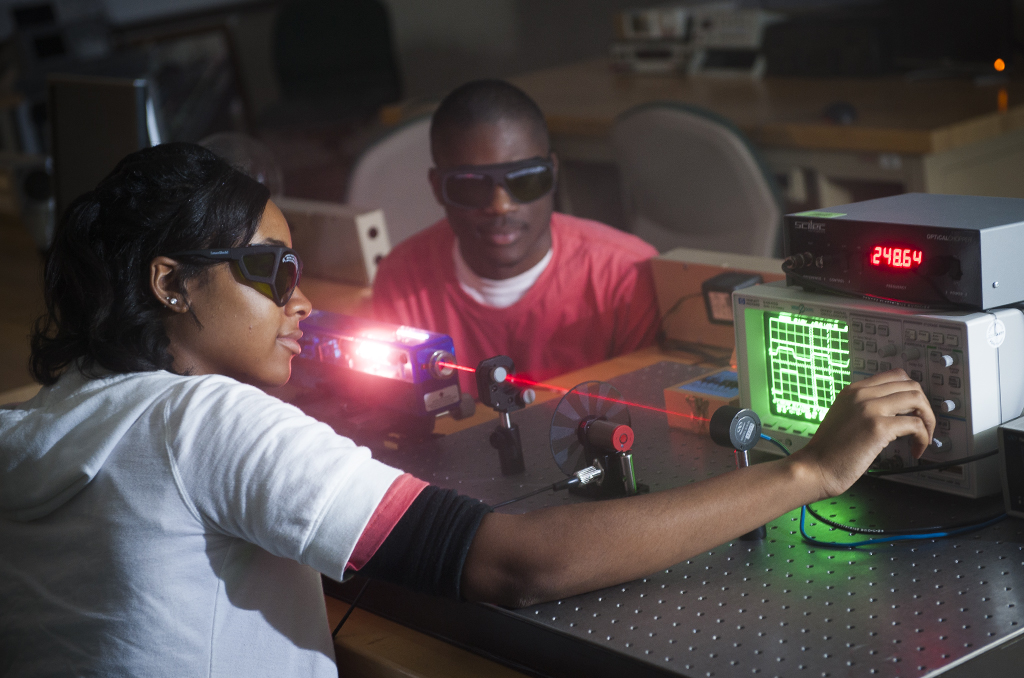Orlando, FL – Indian River State College, along with Valencia College and eight other colleges, has been awarded a $2.9 million grant from the National Science Foundation to establish a regional laser and fiber optics training center that will help meet the need for highly skilled laser and fiber optics (LFO) technicians.
With this grant, Valencia will become part an alliance between the participating colleges and more than 250 companies, which will work together to train more students in the Southeast United States to become laser and fiber-optics technicians.
The burgeoning laser and fiber-optics industry — which creates complex instrumentation for the biomedical, life sciences and information technology fields — needs more than 1,500 technicians each year, but the nation’s community colleges are currently producing only 350 graduates each year. LFO technicians repair and maintain equipment with lasers or fiber-optic sensors, including MRI machines and other medical devices, laser scanners, Internet and telephone processing systems and other industrial uses.
“The growing need for technicians in laser-fiber optics – both regionally and nationally – illustrates the importance of this project to the local area and to our students,” said Dr. Sanford C. Shugart, Valencia College president. “Valencia is committed to providing educational and training opportunities, which will position our students for entry into high-wage positions in the laser-fiber optics field.”
The United States is the global leader in producing laser-enabled equipment that is used in the life sciences. The National Science Foundation grant is designed to help the United States maintain its position as the leader in laser and fiber optics. Corning, which created the first optic fiber, is a partner in establishing the regional training center.
Indian River State College will take the lead in establishing a regional laser and fiber optic technology center, which is designed to serve six states: Florida, Georgia, Alabama, Mississippi, Tennessee, Kentucky, South Carolina and North Carolina.
The Lasers and Fiber Optics Regional Center at IRSC’s main campus in Fort Pierce will coordinate research and training for the 10 participating colleges. The colleges have agreed to participate in a regional training program and create specializations for their laser-fiberoptic technician training programs. The NSF grant will help the colleges set up specialized labs, train faculty members and recruit students.
In addition to Valencia and IRSC, the other principal partners in the initiative are: the Florida Photonics Cluster, Central Carolina Community College of North Carolina, Tri-County Tech College of South Carolina and the Georgia Tech Research Institute.
Dr. Chrysanthos Panayiotou, head of IRSC’s electronics engineering technology department, will serve as the principal investigator for the grant.
Dr. Gaby Hawat, who is special assistant to the president and senior executive for strategic initiatives and economic development at Valencia College, will serve as a co-principal investigator on the project. Hawat has served as a PI and Co-PI on several successful NSF projects and is currently serving on the national board of the Association of Engineering Education.
Under Hawat’s leadership, Valencia College established a unique 2+2 laser photonics program at Wekiva High School in 2009. Funded by Valencia College, Orange County Public Schools and Northrop Grumman Corporation, the program allows high-school students to earn an Associate in Science degree in laser photonics while finishing high school. The program has also become a stepping-stone for many of its graduates to earn college degrees in engineering or engineering technology.
In addition to the Wekiva High School Photonics Academy, Valencia has developed photonics courses and designed a lasers-photonics specialization within the college’s A.S. degree in electronics engineering technology. The college also recently started offering a bachelor’s degree in electrical and computer engineering technology, and incorporates photonics education within that program.
In his role as co-principal investigator for the grant, Hawat will coordinate activities at the partner and participating colleges and will be the liaison to national associations and Florida government.
